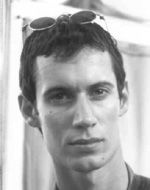Son of Tony and Jonah. He was born on the 9th of Elul 5736 (September 3, 1976) in Kibbutz Beerot Yitzhak, where his family moved to Nir Etzion, where his sister Melissa and his brother Shai were born, and began his studies at the religious school in Nir Etzion. At the age of eight, the family traveled to Atlanta, where he continued his studies, returning to Israel, completing his elementary studies in Nir Etzion and attending high school in the religious youth village Kfar Hassidim, And is very attached to his childhood friends: “Throughout his life he has been characterized by stubbornness, independent spirit, and often rebelliousness. We did not always understand him, we often did not understand his feelings, but we always knew that there was something special and vital that was about to erupt … His friendship and devotion to his friends was a great help in his military service. He had a great ability to call people, children, young and old. He had a great literary talent, and the ability to describe people and situations that fascinated us … He had a deep religious faith that was not always external, but accompanied him in all his actions, especially in recent times. ” He played first in the Hapoel Haifa youth team and then in the team that was established on the Carmel coast and in the Nir Etzion basketball team, and in all the teams he was a prominent player, one of the mainstays, and Magen was not a hardworking student. His energy and energy invested in sport, he was very stormy when he played, he never liked to lose, the desire to win was inherent in him In 1993, Magen traveled with his class to a tour of the death camps in Poland and the Czech Republic, where his seriousness and deep thought were discovered, when he spent a great deal of time reading and studying the Holocaust. In February 1996, Magen joined the IDF with a low profile and served against maintenance. All the while he continued to write letters to all the parties and committees, until two years later the IDF informed him that his profile had been raised, but since most of his compulsory service was behind him, he refused to transfer him to a combat unit. A fourth year – and was moved to his great delight in basic training in paratroopers. After more than two years in the IDF, Magen began his career in the army from the beginning, and in a letter to his friends he briefly described his path: “I was the last to make a radical change. At the age of 21 and a half, I left the base next to the house and joined the paratroopers unit two years later. “In a letter to his sister, he detailed:” There was a goal in the first place about this whole thing of mine – the madness! To leave everything, and to do something else, something different – something to be changed! And Melissa-I’m happy. I am a new person … Here I am who I wanted to be, the one I dreamed of one day. A man without fears and without fear. Does what his instincts tell him. The irony is that a man is finally free in a system without freedom. “In September 1998, he completed a parachuting course and received the red beret at a ceremony at Ammunition Hill, and immediately afterward his unit was sent to serve in Lebanon. His sergeant, but his friends in the company were nicknamed “grandfather.” Erez, his friend in the company, said: “We loved him terribly. Magen was a very professional soldier, a friend of mine, a contributor to the company, and especially friends around him … He liked to give advice – noWe were wise to accept them … “On October 5, 1998, a shield fell in a battle in Lebanon, when a military convoy passed by noon near the town of Hatzbiya in the eastern sector of southern Lebanon. In one of the jeeps, Magen and Staff Sergeant Zohar Doron were killed and additional soldiers were wounded. He was twenty-two years old when he fell. He was laid to rest at the cemetery in Nir Etzion. Survived by his parents, sister and brother. After his fall, he was promoted to the rank of sergeant, who served only about a week in Lebanon, but stood out in his ability, as his commander, Yaron, told him: “The charisma that was in you and the ability to sweep people is reflected in the many missions that you received from your commanders … You had a lot of motivation, And never ceased to be a leader. Always smiling, always willing to volunteer … Shield, you have successfully completed basic training and advanced training without problems, and you have finally arrived in Lebanon. Your dream of being a warrior serving in Lebanon has come true. “Bulletin No. 44, newsletter of Moshav Nir Etzion, is devoted mainly to the words of family members, members of the moshav and the army on a shield.” The rabbi of the moshav, Ronen Lubitz, wrote: “They called you a protector , And that’s exactly how you found your death, when you are defending a convoy inside Lebanon in operational activity. They called you a defender, but if we use the language of the world of sport you loved so well, you loved the attack, not just the defense. Not only in basketball, in life as a whole you were proactive and active, indifference and passivity were not your lot, you did not always sit on your feet, you always loved to run forward. This feature of yours is so evident in the army. You were all a symbol of motivation, the pillar of fire that precedes the camp and embodies in its personality the concept of a fighting spirit. “
